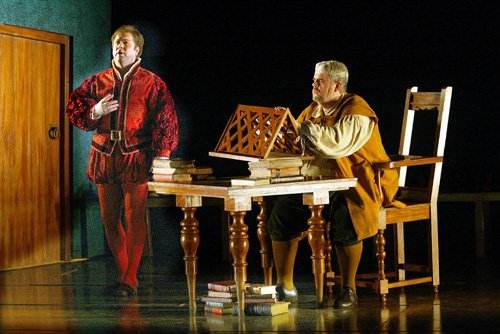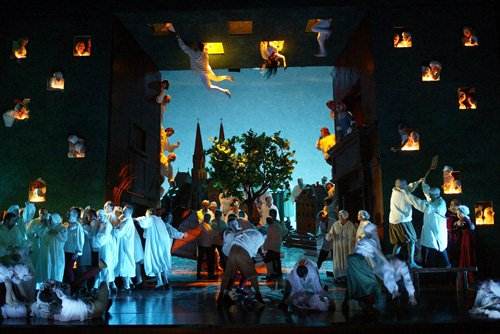S & H Opera Review
Wagner, ‘Die Meistersinger von Nürnberg’ The Royal Opera, Covent Garden. November 20th 2002. (ME)
A welcome return to Covent Garden for this affectionate production which places the opera in the context of bourgeois Nürnberg rather than any more abstract realm of a poet’s imagination or a musician’s vision. ‘So much more fun than the ‘Ring,’ was the verdict of one lady in the audience, and this is certainly a production which goes for the lighthearted rather than the sombre approach to Wagner’s great work.
The two best singers on stage were the Kothner and the Magdalene; a surprising statement, but true. I have previously praised James Rutherford’s beautifully warm, cultivated baritone: he sang the bass arias in the ENO ‘St. John Passion’ last season with rare eloquence, and his Kothner was delightfully pompous without being overdone, sung with superb diction and sensitivity of line. Diana Montague is always worth hearing, and her Magdalene was no exception, with supple, burnished tone and completely convincing acting, from the more stagy moments where she comes between Eva and Walther, to the touching little gestures of her relationship with David.
Arnold Bezuyen was making his house debut in that role: his unaffected stage presence went some way to make up for a rather strained tone at times, although his impassioned introduction to the rules for Walther’s benefit was more confidently phrased, and he was touching in his later scenes with his master. Eike Wilm Schulte was an endearing Beckmesser, perhaps too much so, but it’s worth remembering that this character is still a Mastersinger, however little he consistently lives up to their highest ideals. His committed acting and incisive singing gave much pleasure, and his attempt at a ‘Prize Song’ was suitably laughable without entirely removing all his credibility.
Some of Wagner’s most noble music is given to Pogner, so it was a pity that Kristinn Sigmundsson was so dry of voice and unsympathetic of manner: ‘Eva, mein einzig’ Kind…’ did not move as it should, and ‘O Sachs! mein Freund! Wie dankenswert…’ got rather lost instead of forming a crucial high point. Gwynne Howell, the Pogner when this production was previously seen here, is of course a hard act to follow, as indeed is John Tomlinson, the earlier Hans Sachs. Those whose memories go back a little further may well share my own affection for Norman Bailey’s tender, paternal yet majestic Sachs, and compare those great singers favourably to Jan-Hendrik Rootering’s much less vulnerable figure. This Sachs is curmudgeonly more than anything else, and he provides plenty of ammunition for those who consider this character to be a dreary old bore, since his singing and acting are both rather reserved and uncharismatic; his ‘Flieder’ monologue was at times growled as opposed to sung, often before the beat, but he did look very uncomfortable with himself for much of the time, so it is possible that he was unwell on this occasion.
Amanda Roocroft has a vast range of roles in her repertoire, but I am still waiting to hear her in the one which will reveal what I am assured is a lustrous soprano; on this showing, it is not that of Eva, since her singing was at best attractive, at worst shrill, and she seemed to me to lack the sweetness of tone and manner essential for Wagner’s ‘Little Ev’chen.’ Such moments as ‘Euch, oder keinen!’ went for nothing, and much of the time she seemed to be concentrating on just getting the notes out, without having room to spare to give them the expression they needed. ‘O Sachs! mein Freund!’ was thin in tone and lacking in warmth, and she launched the quintet with a ‘Selig, wie die Sonne’ which was accurate but hardly ecstatic. Perhaps she, too, was indisposed or just going through a bad patch.
Robert Dean Smith seems to be in demand everywhere in such roles as Walther, and one can hear why. He is not Ben Heppner, but then not everyone likes that tenor as much as I do; he is however, a more than merely serviceable Walther, as long as you are content with accurate, mostly tasteful singing and a fairly conventional stage presence – not that he has much chance to shine in that department. ‘Am Stillen Herd’ was his best moment, full in tone and convincingly phrased, and although he’s hardly the ideal romantic hero (he wasn’t helped by costumes that made him look as though he were wearing one’s great-aunt’s living room curtains along with her favourite baking tray) he made a game stab at creating a believable lover and would-be Mastersinger.
The other Masters were presented with the now-familiar eccentricities which can at times render them more foolish than they need to be; they are stuffy old representatives of a different era, but most of the music Wagner gives them is noble in character, and their antics did not always match up with the music they are given. Servants, apprentices and townsfolk were all lovingly characterized and wonderfully costumed, and all were lit with that soft-edged, rustic glow which so evocatively suggests warm midsummer days and nights.
Orchestrally, matters got off to a tentative start, with most of the overture rather messily directed, but Mark Wigglesworth managed to pull things together by the entry of the Mastersingers, and the Act Three prelude was the perfect blend of introspection, grandeur and poetry. The large choral scenes were superbly managed, especially ‘Wach auf!’ and the support given to the singers was highly sensitive.
Graham Vick’s production is of course much loved, having won the award for ‘Outstanding production for Opera’ in the year of its inception; it is a glowing interpretation, not remotely challenging or in any way echoing the huge changes in emotional and artistic climate proposed by the music, but presenting a cosy miniature world, at once accessible to everyone and crystallized in the vessel of its own singularity. The vital moments of emotional contact – Sachs listening to Walther’s attempts to articulate his feelings, David and Sachs in the workshop, Eva and her father in the evening, Sachs and Eva as she realizes what he has done for her – are astutely but not especially movingly done, and the whole is a highly enjoyable rather than emotionally powerful experience.
Melanie Eskenazi
Die Meistersinger von Nurnberg - Wagner
ROH 9.11.021. Walther von Stolzing - Robert Dean Smith (left)
Hans Sachs - Jan-Hendrik RooteringPhoto Credit: Clive Barda
2. Walther von Stolzing - Robert Dean Smith
Eva - Amanda Roocroft
Magdalene - Diana Montague
David - Arnold Bezuyen
Veit Pogner - Kristinn Sigmundsson
Sixtus Beckmesser - Eike Wilm Schulte
Hans Sachs - Jan-Hendrik Rootering
Kunz Vogelgesang - Alasdair Elliott
Konrad Nachtigall - Jonathan Gunthorpe
Fritz Kothner - James Rutherford
Hermann Ortell - Jeremy White
Balthazar Zorn - Robin Leggate
Augustin Moser - Martyn Hill
Ulrich Eisslinger - Philip Sheffield
Hans Foltz - Dean Robinson
Hans Schwarz - Andrew Greenan
Nightwatchman - Graeme BroadbentPhoto Credit: Clive Barda


 Return to:
Return to: